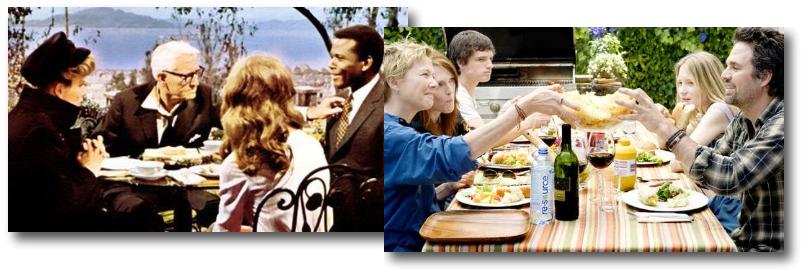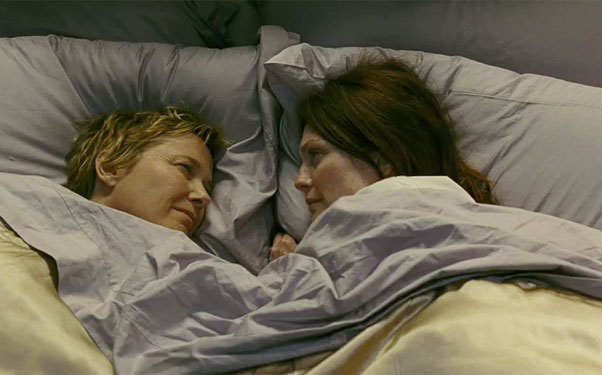Distant Relatives: Guess Who's Coming to Dinner and The Kids Are All Right
 Thursday, February 10, 2011 at 11:59PM
Thursday, February 10, 2011 at 11:59PM Robert here, with my series Distant Relatives, where we look at two films, (one classic, one modern) related through a common theme and ask what their similarities and differences can tell us about the evolution of cinema.

Your sons and your daughters are beyond your command
The relationship between art and social change is one open to debate, with some people believing that art is essential to such change and others believing that its influence is non-existant or minimal at best. Still, as society continues its constant march forward, we can disagree about whether great art can effect it, while perhaps agreeing that the best art often reflects it, becoming a statement of what it meant to be in a certain time and place while touching upon deeper human truths that elevate it to the realm of timeless. Guess Who's Coming to Dinner and The Kids Are All Right are two films from two different times in American history that deal with the changing definition of marriage. Both are domestic dramas. Both find their conflict by indroducing an unfamiliar outsider into a comfortable family atmosphere. But each handles the social issue at their center differently, the prior attempting to effect it, the latter to reflect it.
Guess Who's Coming to Dinner is the tale of a stalwart, liberal, San Francisco couple (Spencer Tracy and Katherine Hepburn) whose stalwart liberalism is challanged when their daughter brings home her new fiance, a brilliant, black man (perfect in that he is Sidney Poitier, imperfect for that same reason). Director Stanley Kramer, a great craftsman who never met a social issue he couldn't direct the hell out of, fills the next two hours with a series of soul searching debates, safe revelations, long speeches, and a delightful scene where Tracy gets into a fender bender with a black driver while trying to procure himeself some comfort ice cream. "Thirty or forty bucks, that's how much" says the other driver when asked the approximate cost of fixing his car. And so it is, Guess Who's Coming to Dinner is a film of its time.
The Kids Are All Right tells of a long standing lesbian couple, Nic (Annette Benign) and Jules (Julianne Moore) whose family is thrown into chaos when their kids bring their own guest to dinner. In this case, it's the man whose sperm is responsible for both youngsters. Played by Mark Ruffalo as a free spirited man of the earth, Paul's intrusion is dangerous as a disruption of a family unit already fragile from nothing more than the emotional comings and goings of every day life. In a series of events that involve less pontificating than the older film, Paul comes to represent an individual escape for each family member, something new, exciting, refreshing, as they come to mean the same for him.

Tell me who are you?
While both films purport to begin from a place of viewer sympathy, traditional (whatever that means) married couples will find more in common with Nic and Jules than Dinner's Matt and Christina Dreyton. Matt is a newspaper publisher. Christina runs an art gallery. Their daughter Joey is studying in Hawaii when she meets Poitier's John Prentice. They are clearly the creme de la creme of society. Their lives, until the introduction of John are pretty perfect. Contrastly Nic and Jules are at a point in their marriage where their love for each other, while clearly evident, is starting to be overshadowed by the little annoyances, work stresses, and two teenage kids who are, as teenagers tend to do, struggling to find their places in the world. The fact that Nic and Jules are lesbians, while essential to the story, is also almost beside the point. Their family is your family.
Guess who's Coming to Dinner casts the viewer in the role of the All-American white family who must deal with change when it shows up at their doorstep. The Kids Are All Right casts the viewer as the unconventional family with two matriarchs who must deal when the All-American man (what is Paul but a modern cowboy with a motorcycle instead of a horse?) shows up at their door. According to both films, if you’re of the family’s young generation, you’re likely to embrace or even introduce the change. If you’re parental but romantic, you’ll come around quickly, but if you’re stoic and cynical, you’ll take far more convincing.
We got this solid love
This casting speaks loudly to each films’ motives. Guess Who’s Coming to Dinner is a persuasive piece. It wants to change your mind and suffers from it. The film creates a number of devices to funnel every conflict into the interracial message issue. Included in this are the aformentioned beatification of Poitier’s character, his refusal to marry without the Dreytons’ consent, the short amount of time he and Joey have known each other (1 week -- drama!), Joey’s willingness to define herself only in terms of his wife (“and when we’re married, I’m going to be important too,” she says), and their impending departure to marry (that evening). Now, over forty years later when the interracial marriage element is a non issue, all of these, combined with the fact that Poitier is closer in age to his fiancee’s parents than hers, linger as genuine issues that you wish the characters would be reasonable to address. The film still stands as a slice of time and place but has cornered itself out of any larger universal context.
The Kids Are All Right is different. There’s no attempt here to manufacture drama. If the film does anything to make a persuasive argument for gay marriage it's by presenting Nic and Jules and their family as likable, flawed, realistic, capable of surviving great challanges but not without great effort. But generally the film seems disinterested in dignifying the debate by becoming piece of propaganda. The final statement seems to be one in favor of the strong bond of family. Only those who put in the hard work can be a part. So there is another common theme between the films, they are both strongly and progressively pro-family.
The final similarity between these two films (and by means of feeling I've been a little too hard on Guess Who's Coming to Dinner) is a great cast, a collection of fantastic performances, filmmakers who, whatever their motives, have a clear and great empathy and understanding of their characters, and a general sense that life is measured in dinnertimes, when everyone gathers around in anticipation of joy, drama, food and family.



Reader Comments (10)
Off topic: Can we have the masthead of the blog showing stars dressing up? it would be awesome in anticipation of the big night!
Nice piece Robert. I wouldn't have thought to pair them primarily because of The Kids Are All Right's very smart apoliticism. I mean, it's not really apolitical (what is?) but like you said, it's refusal to argue or validate the point of "ohmygodgaymarriage!" it becomes a much stronger film -- and I think one that won't suddenly feel old in 20 years when people think "what was the big deal with gay marriage?" because it as a film doesn't worry about this. it's ALREADY ahead of society rather than trying to gently lead it somewhere.
Everything has politics. It just dates the movie to wear them on their sleeve. Take Heathers: The political statements are so strong and strident that it's almost painful to watch. The most egregious example is Veronica telling her parents to not watch the program on teen suicide. I don't hate the movie (love it), but after the first quarter of the movie, when the politics start taking hold, it really starts screaming "I'm a political screed" as much as it screams "I'm a dark comedy." Comparably, Dr. Strangelove holds up better for one reason: Disarmament hasn't occured. Fear of the nuke is still rampant and, subsequently, it's political statement is still important. Heathers...no one's obsessing over the suicide rate anymore.
volvagia -- maybe you haven't been watching the news this year but teen suicide has been a constant topic -- usually in tandem with bullying editorials.
The thing that stood out and bothered me most about Dinner (and admittedly, it's been years since I've seen it) is the very clip included in this post. I know Poiter's characters is expressing what is probably a rather common feeling in the modern era "I don't owe you nothing" - vs the more traditional values of family and respect for one's parent's, etc - but there was still something terribly ungrateful in that whole speech, in the attitude of a younger man toward someone who didn't have many legal rights or opportunities. And my impression of the film was that the scene ended with Poiter's diatribe and thus the implication that his character was right, reducing his father to a racist and someone who willingly accepted an "uncle tom" role, besides.
I may be wrong in my interpretation - and admittedly I was in my teens when I saw it - but that was the impression the film left me with, and has stayed with me of that film for decades.
Overall a very nice analysis Robert; I saw TKAA last year and would have never have thought to link the two films. I could, however, see a lot of my relationship with my sweetheart in theirs, even though we don't have children and are in a different economic class.
Guess Who's Coming to Dinner is very dated, I might add.
I'll quote my dad on this one: "If your daughter's husband-to-be is a doctor and looks like Sidney Poitier, are you really going to complain about his race?"
I don't watch the news much, but weren't a lot of those stories also tied in to homophobia? Homophobia, as opposed to suicide itself, is turning into the issue du jour. And, yes, ironic tie to Heathers (faked gay teen suicide) but the point is that a straight person committing suicide is getting a lot less coverage these days. Sorry if I wasn't clear enough and thanks for prompting this expansion. And Robert: I, also, would have thought this film along different lines. My article would have tried linking it to Shadows. Can't wait to see what you link Toy Story 3 (my choice: Auntie Mame), Winter's Bone (My choice: Deliverance), True Grit (My choice: RIo Bravo), 127 Hours (my choice: Hud) The Social Network (My choice: The Sweet Smell of Success) and The King's Speech (My choice: The Lion in Winter) to.
Andrew R -- I do love the many lengths the film goes to to assuage any fears white people might have about Poitier's character. Not only is he a doctor but one so great he has ideas that will change the world. A backstory involving a wife and child killed in a car crash is for anyone wondering why he's that age and unmarried. Even a scene where he comments on the attractiveness of one of the Draytons' black maids seems to only serve the purpose of calming anyone subscribing to the racist suspicion that he's only got a thing for white girls.
robert -- i remember that being my main problem with the movie, too. i don't have much time for saints at the movie. it kills drama because it's just too coddling.
Not necessarily Distant Relative but more like Kissin' Cousins--"The Kids Are All Right" and "Dogtooth".